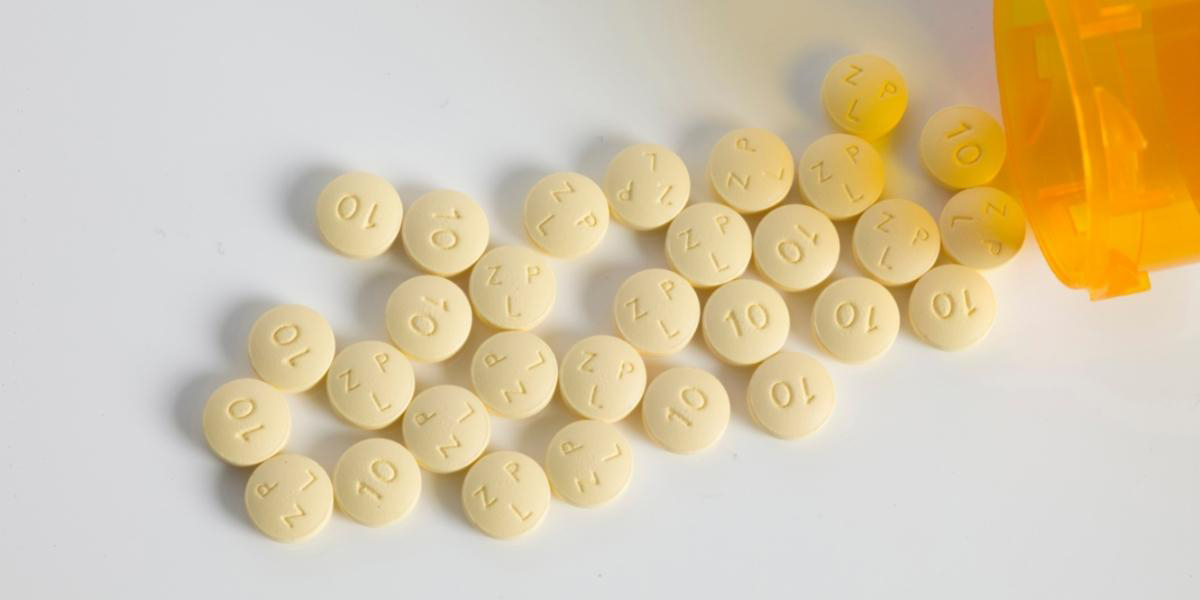Is Ambien Addictive?
Ambien Abuse and Dependency

In the United States, over 15 million people turn to prescription sleep medicines, like Ambien, to help their insomnia.
Medical professionals initially thought sleeping pills were not habit-forming and had a low risk of physical dependence; they were considered a tool to help correct poor sleeping habits.
As the number of people taking and abusing sleep aids increased, reports of side effects, health problems, drug addiction, and Ambien overdoses, often involving alcohol and drugs, also increased.
In 2020, the National Survey on Drug Use and Health (NSDUH) results showed that roughly 343,000 people abused prescription sleep medications for the first time.
What Is Ambien?
Ambien is a prescription sleep medication used to treat insomnia. The generic name for Ambien is zolpidem, classified as a sedative-hypnotic drug. These sedative-hypnotic drugs are called “Z-drugs.”
Zolpidem comes in tablet form, an extended-release tablet (Ambien CR), an oral dissolvable tablet (Intermezzo, Edluar), and an oral spray solution (Zolpimist).
Meant to be taken as needed, not long-term, Ambien helps people fall asleep easier and assists them in staying asleep for more extended periods of time.
Like benzodiazepines, Ambien is a central nervous system depressant and binds to specific nerve receptors throughout the brain to create sedation and drowsiness.
Is Ambien a Controlled Substance?
The generic name for Ambien, zolpidem, is classified as a Schedule IV controlled substance with a low potential for abuse and limited physical or psychological dependence.
Is Addiction a Concern?
While it takes longer than other, more potent drugs, it is possible to develop a psychological and physical dependence on Ambien in as little as two weeks.
The National Institute on Drug Abuse (NIDA) estimates that 1.2 million Americans have a sedative use disorder.
The maker of Ambien, Sanofi Aventis, mounted a widespread marketing campaign to push it as a safe, non-addictive medication, much like Purdue Pharma did with OxyContin.
Ambien addiction is similar to benzodiazepine addiction. Many people who abuse this medication mix it with alcohol and drugs to enhance the effects, leading to cross addiction and dangerous side effects.
The Drug Abuse Warning Network (DAWN) reports that between 2005 and 2010 showed that emergency room visits regarding Ambien increased by 220% in those five years. Half of these visits involved other medications.
In 2013 the Food and Drug Administration (FDA) changed its recommended dose amount and added to its warning label to reflect potential dangers and addiction risks.
If you worry you are becoming dependent, seek medical advice to explore your treatment options.

Signs and Symptoms
It can be challenging to spot Ambien addiction, partially because it can present the same symptoms as insomnia, making people seem worn out, short-tempered, and distracted.
At first, people may appear to be thriving if they begin sleeping better. However, Ambien abuse does have signs and symptoms that become more apparent with time.
Physical symptoms of Ambien abuse include:
- Drowsiness during the day
- Lack of coordination
- Dizziness
- Nausea
- Memory loss
- Slow heart rate
- Labored or slow breathing
- Sore throat
- Sinus congestion
- Joint pain
- Bloodshot eyes
- Delayed reaction time
- Hallucinations
- Withdrawal symptoms
While some of the physical symptoms of Ambien addiction can be explained by lack of sleep or other circumstances, other specific behavioral patterns are undeniable signs of addiction.
Behaviors that indicate Ambien addiction include:
- Taking high doses to feel the effects more
- Mixing Ambien with other substances
- Visiting multiple doctors to get prescriptions
- Buying it illegally
- Getting it from friends or family
- Inability to stop due to cravings or withdrawal symptoms
- Chronically sleeping longer than you meant to
- Missing obligations because you are exhausted
Because most people take this medication before bed, you might not physically see them taking the pills, so it is essential to know other warning signs of abuse and addiction.

How Tolerance of Ambien Starts
Even if you take Ambien precisely as prescribed by a doctor, you can still develop a tolerance to it.
Tolerance means your body and brain activity become used to the presence of Ambien, adjust chemical balances to function, and eventually stop responding to the original amount that once produced a reaction.
The same properties that make Ambien effective also lead your body to develop a tolerance to it and require larger doses to feel the same effects as when you started taking it.
As a user’s tolerance builds, the high doses have less impact.
The back and forth between developing tolerance and taking more Ambien or mixing it with other substances turns into a dangerous cycle of abuse resulting in addiction.
In a person with high tolerance, withdrawal symptoms will be intense and possibly dangerous if they try to quit Ambien cold turkey.
Side Effects of Ambien
The desired effects of Ambien are the ability to fall asleep faster and get a better quality of sleep.
However, besides being habit-forming, there have been well-reported effects of Ambien that range from undesirable to life-threatening.
Some people who take zolpidem recreationally claim that if you can stay awake through the initial feeling of drowsiness, you experience a wave of euphoria and calm.
Side effects of Ambien use include:
- Recurring dizziness
- Memory loss
- Chronic fatigue
- Hallucinations
- Extreme mood swings
- New or increasing depression
- Anxiety
- Intrusive thoughts
- Suicidal thoughts
Complex Behaviors
Ambien is well known for stories about people doing things while asleep with no memory of it when they wake up.
This type of behavior was so common in people taking Ambien that doctors designated a name and category for it— complex behavior.
The Food and Drug Administration (FDA) defines complex behavior as “engaging in activities while not fully awake or having no ability to recall activities you have done while taking medicine.”
Over the years, more than a few injuries and deaths have resulted from complex behaviors while people were on Ambien.
Documented complex behaviors while taking Ambien include:
- Sleepwalking
- Sleep driving
- Binge eating
- Cooking
- Shopping
- Driving
- Household chores
- Sexual activities
- Conversations
- Being outdoors in inclement weather
- Physical altercations
- Accidental overdoses
- Self-harm
- Suicide attempts
There are very few effective prevention measures for complex behaviors, especially for people living alone.
Most people cannot recall doing these things or have only a vague recollection, and you cannot stop something you never planned to do.
Quitting Ambien is the only way to ensure your safety fully.

Ambien Withdrawal Symptoms
The safest way to quit Ambien is to call your doctor and plan to taper off. Although you may still experience withdrawal symptoms, they will be less intense than stopping cold turkey.
Withdrawal symptoms typically start within 48 hours of the last dose of Ambien and range from disruptive to life-threatening.
Ambien withdrawal symptoms include:
- Rebound insomnia
- Anxiety
- Mood swings
- Sweating
- Nausea
- Vomiting
- Shaking
- Fatigue
- Increased heart rate
- Restlessness
- Stomach and abdominal cramping
- Panic attacks
- Confusion
- Delerium
- Increased blood pressure
- Body temperature fluctuations
- Seizures
If you are experiencing a medical emergency, call 911 or have someone take you to the nearest emergency room.
Medication-assisted detox from a qualified treatment center may be necessary in some cases of severe addiction.
Treatment for Sedative Addiction
If you or your loved one has an addiction to sedatives, help is available.
At Northridge Addiction Treatment Center, our approach to addiction treatment heals the whole person by addressing all underlying aspects of substance abuse and its co-occurring mental health conditions.
Our expert team at NATC has been entrusted with getting and keeping you on your path to recovery in a supportive, judgment-free environment.
Our inpatient residential treatment center offers on-site medical detox to help you safely get through withdrawal symptoms and begin to reset your body and learn healthy habits.
We use evidence-based treatment programs such as cognitive-behavioral therapy, dialectal behavior therapy, and 12-step facilitation to learn how abusing drugs and alcohol has affected your life, repair that damage, and maintain a solid, lasting future in recovery.
Reach out today. Our treatment specialists look forward to answering any questions you have.
Find Meaningful Recovery
Our caring and compassionate specialists are eager to help you comfortably navigate this journey to recovery. Our individualized treatment plan, programs, and therapies may be a perfect match for you or your loved one. Let us assist you in living the happy life you deserve. It starts with a phone call.




